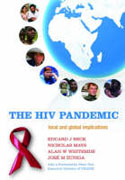
The HIV pandemic: local and global implications
Beck, Eduard J.
Mays, Nicholas
Whiteside, Alan W.
Zuniga, José M.
A quarter of a century since the first recognition of HIV/AIDS in 1981, this book reflects on the international impact of the disease. It has persistently remained a global issue, with more than 50 million people worldwide estimated to have been infected since that date. This ambitious book, written by 165 authors from 30 countries, offers a multi-country comparative study that examineshow the response to the common, global threat of HIV is shaped by the history, culture, institutions and health systems of the individual countries affected. Increasingly the shift of health systems has been from prevention only as the main containment strategy, to a strategy that includes scaling up HIV treatment, and care and prevention services, including antiretroviral therapy. Thus, all parts of the health system must be involved; policy makers, healthcare professionals and users of the services have been forced to think differently about how services are financed, how resources are allocated, how systems are structured and organized, how services are delivered to patients, and how the resulting activity is monitored and evaluated in order to improve the effectiveness, efficiency, equity and acceptability of the response. This book is unique in attempting to describe and assess a range of responses across the globe by situating them within the characteristics of each country and its health system. Most chapters combine a health policy expert with an HIV specialist, allowing both a 'top down' health system approach and a 'bottom up' HIV-specific perspective. There are thematic and analytical sections, which provide an overview and some suggestions for solutions to the most serious outstanding issues,and chapters which analyse specific country and organisational responses. There is no perfect health system, but the evidence provided here allows the sharing of knowledge, and a opportunity to assess the impact and reactions, to an epidemic that must be considered a long term issue. INDICE: THE PANDEMIC; 1. The HIV Pandemic and Health Systems: An Introduction; 2. The Evolving HIV Pandemic; 3. Social and Economic Impact of the HIV Pandemic; 4. Determinants of the HIV Pandemic in Developing Countries; PREVENTION, TREATMENT AND CARE: ADVANCES IN KNOWLEDGE; 5. HIV Prevention Programmes: anOverview; 6. Antiretroviral Treatment and Care of HIV; 7. HIV Vaccines: Development and Future Use; 8. Ethical Issues and HAART; 9. Legal and Human Rights Implications; 10. Strategic Information for HIV Programmes; 11. The Contribution of Cost-effectiveness Analysis; COUNTRY RESPONSES; 12. Botswana; 13. Ethiopia; 14. Nigeria; 15. Senegal; 16. South Africa; 17. Uganda; 18. Cambodia; 19. China; 20. India; 21. Indonesia; 22. Philippines; 23. Thailand; 24. Barbados; 25. Cuba; 26. Haiti; 27. Jamaica; 28. Argentina; 29. Brazil; 30. Costa Rica; 31. France; 32. Italy; 33. Russian Federation; 34. Spain; 35. Ukraine; 36. United Kingdom; 37. Canada; 38. Mexico; 39. United States of America; GLOBAL AND NATIONAL RESPONSES; 40. The UN response to the HIV Pandemic; 41. Donor, Lender and Research Agencies' Response to the HIV Crisis; 42. Financing HIV: the Roles of International Financial Institutions; 43. Fiscal and Macroeconomic Aspects of the HIV Pandemic; 44. Trade, Intellectual Property and Access to Affordable HIV Medications; 45. Country Level Public-Private Partnerships for Successful HIV Treatment Programmes; 46. Developing Human Resources for the HIV Pandemic; 47. The Contribution of Civil Society; 48. The Role of Community Involvement in HIV Programmes in South Africa; STRENGTHENING THE RESPONSE; 49. Responding Effectively to the HIV Pandemic; 50. Some Lessons Learned.
- ISBN: 978-0-19-923740-1
- Editorial: Oxford University
- Encuadernacion: Rústica
- Páginas: 799
- Fecha Publicación: 01/01/2008
- Nº Volúmenes: 1
- Idioma: Inglés
